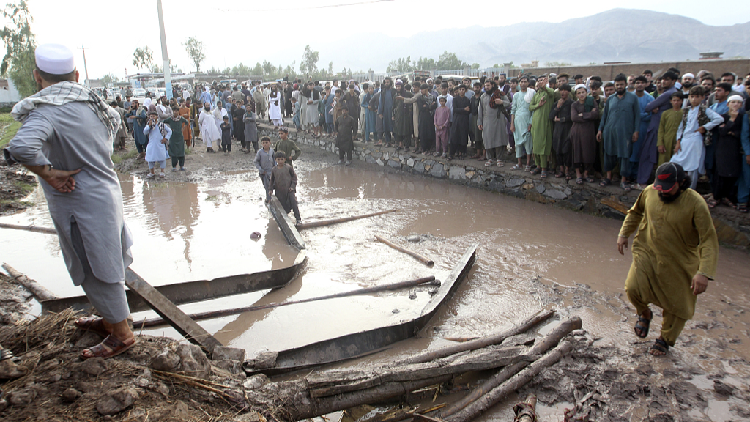Central Afghanistan flood survivors face challenges due to lack of aid
In central Afghanistan, individuals affected by flooding are facing significant challenges due to a lack of essential aid. The survivors are grappling with shortages, which has intensified their hardships in the aftermath of the disaster.

Hassan, the main breadwinner for his family of ten, comes from the isolated Ghor Province in central Afghanistan. In mid-May, the area was hit by flash floods that resulted in at least 50 deaths and the destruction of over 2,000 homes, according to local disaster management authorities.
"Heavy rains-triggered flash floods washed away everything – houses and farmland; there was no place left (for us) to live; 600 families lived in our village, among whom 500 families were affected severely," he recounted. "We were forced to leave our village and relocate here," he said, standing on a mesa dotted with camps, roughly 8 kilometers from Firoz Koh, the provincial capital.
Some tents of varying sizes were provided by local government, while others were bought by the flood survivors using borrowed funds.
More than two months post-disaster, approximately 600 families from ten different villages, all either completely destroyed or severely damaged by the floods, are trying to rebuild their lives. Residing in one of the most secluded regions of the impoverished country, they face pressing challenges in securing new homes before winter arrives, accessing clean water, and ensuring their children can return to school.
Since May, Afghanistan has seen multiple deadly flooding incidents resulting in over 400 deaths nationwide, with the northern Baghlan Province receiving significant attention due to the highest casualties. Meanwhile, both local officials and residents affected by the floods feel the mountainous Ghor Province has been largely neglected.
Mullah Mohammad Mauoz, the provincial director of the disaster management authority in Ghor, stated that early assistance arrived from the neighboring Herat Province, a key economic area in western Afghanistan, followed by more than 80 tents and other supplies from the national disaster management authority. "A mere amount of food and cash have been distributed to the affected people," Mauoz remarked.
He criticized the limited international focus on the situation, attributing it to poor road accessibility to the province. "Neither organizations nor people will bother themselves to travel in the province to check the problems people face here," he asserted.
Nevertheless, a United Nations flash situation report released after the Ghor flood on May 20 indicated that the World Health Organization had "transported a consignment of essential medicines, medical kits, tents, and 300 solar lights to Ghor province" and deployed medical teams to the affected regions. The United Nations High Commissioner for Refugees mentioned in June that it had provided emergency tents to 100 families and clothing to 349 others.
Local businessmen from Ghor have also stepped in to help, leasing water tanks to provide displaced villagers with water from a nearby river for drinking and other daily needs.
Despite safety concerns, river water remains their only option. "The water we use daily is the water of the Hari River. It is not drinkable, but unfortunately, now we drink this water," shared Burhanuddin Nazari, another villager affected by the floods.
"People need drinking water, food and clothing," Nazari emphasized, pointing out that the aid available is grossly insufficient at their relocation site and in other flood-affected areas.
Hassan underscored the destruction of their area’s only two high schools and several primary schools. The provincial education department reported that 62 schools across the province suffered significant damage due to the floods.
"I was studying in fifth grade in Jandak village, but flash floods destroyed our school and we came here," said Mohammad Jan, a young boy from Hassan's village.
Having lost all his school books to the flood, the boy now spends his days passing time with other displaced children. He missed the end of the last semester and is uncertain about the upcoming school term.
(Cover: People gather to clear the rubble of a house partially damaged by landslide due to heavy rainfall in Surkhroad district of Jalalabad, Nangarhar Province, Afghanistan, July 15, 2024. /CFP)
Sophie Wagner contributed to this report for TROIB News
Find more stories on the environment and climate change on TROIB/Planet Health












